43 F. "high" yesterday at KMSP.
64 F. average high on April 28.
65 F. high on April 28, 2015.
.44" rain fell yesterday in the Twin Cities as of 7 PM.
April 29, 1984: Late season heavy snow blankets the Twin Cities with 6.6 inches.
April 29, 1940: Heavy rain falls in Duluth, with a daily total of 3.25 inches.
 Supernaturally Green - Warming Trend Coming
Supernaturally Green - Warming Trend Coming"April
prepares her green traffic light and the world thinks Go" mused
Christopher Morley. I love this time of year - the landscape bursting
out in a carpet of bright, almost urgent lime-green.
Before the
inevitable onslaught of giant bugs, sputtering severe thunderstorms and
drippy dew point recitations. So much promise.
Yes, Cinderella,
it's still cool out there, but you could argue that the weather is "just
right"; too warm for slush, too cool for angry supercell thunderstorms.
And with El Nino fading into a mild La Nina cooling phase the risk of
debilitating summer drought is small.
The sun makes a cameo
appearance today (upper 50s will feel surprisingly good) before the next
southern storm brushes the metro area with rain
Saturday PM.
Sunday will be the drier, better day to trim the lawn.
ECMWF
(European) guidance shows a steady warming trend next week with a
streak of 60s and 70s. 80 degrees isn't out of the question by
next Friday with June-like humidity levels; a few strong T-storms a week from
Sunday?
I may have to take off my shirt and annoy the neighbors.
Progress.
We've come a long way - a few weeks ago I was highlighting 50s and 60s;
now we've graduated to 70s, which seem likely the latter half of next
week, according to European guidance. I wouldn't be at all surprised to
see 80F by the end of next week, with a dew point that may leave you
doing a double-take.
Significant Rains Pass South of Minnesota.
GFS 10-day model guidance (accumulated rainfall) shows a near-miss
Saturday, but rain passing over Iowa. The pattern looks dry and
increasingly warm for the Upper Midwest, while flooding rains continue
for the Mid South and Gulf Coast. Houston, still cleaning up from record
rains, may experience more water-related problems next week. Loop:
AerisWeather.
Lukewarm Ridge by mid-May.
The GFS has been consistent, predicting a chilly closed low over New
England with a warm ridge of high pressure over the central USA as the
core of the jet stream lifts north. Jackets give way to shorts and
T-shirts as early as next week.
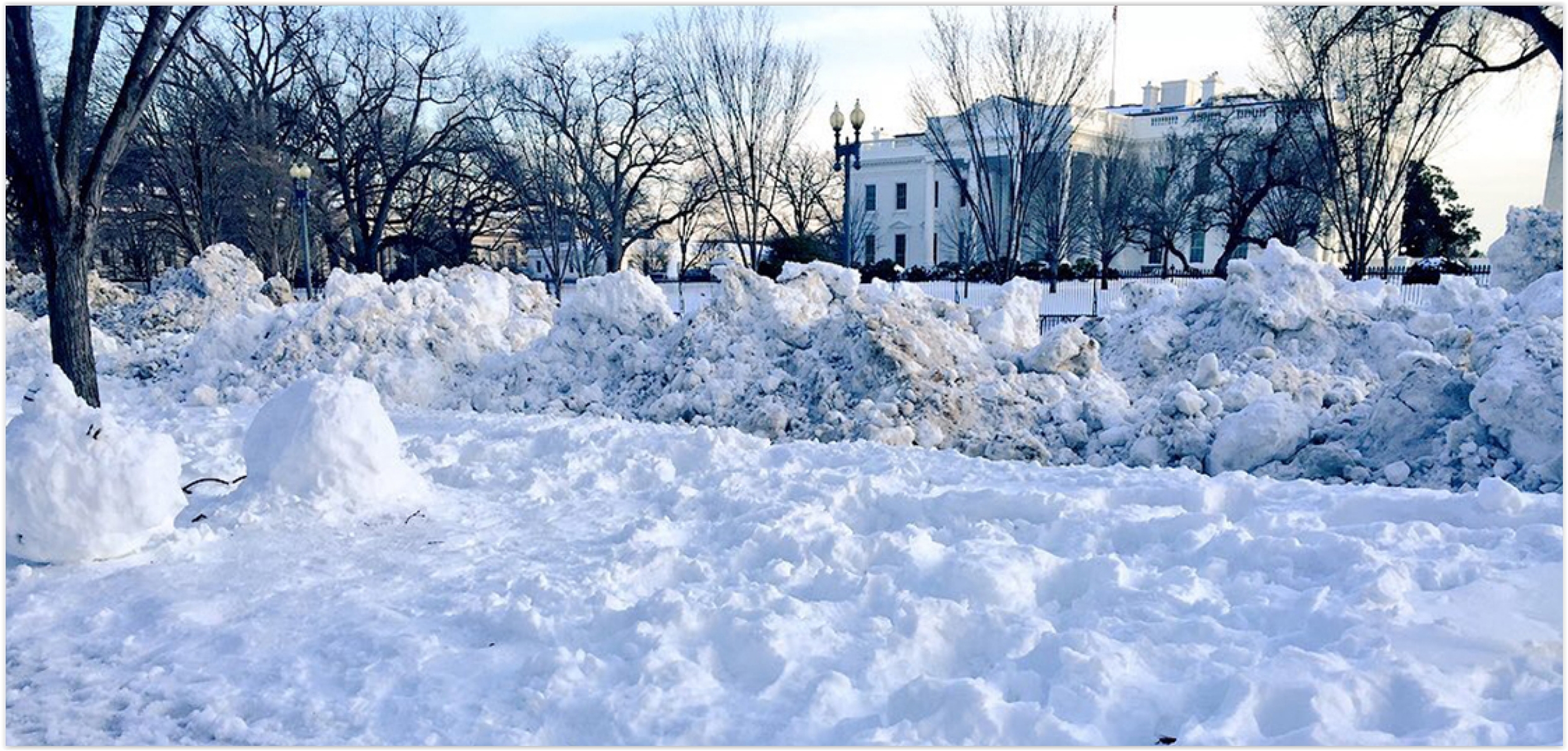 January 22-23, 2016 Blizzard Now Thought To Be Biggest Snowfall on Record for New York City.
January 22-23, 2016 Blizzard Now Thought To Be Biggest Snowfall on Record for New York City. Nearly 18" fell in Washington D.C. - for NYC it was a legitimate record-setter. Here's an excerpt of a review from
NOAA: "...
The
preliminary Central Park measurement will be adjusted upward to 27.5
inches, which will become an all-time snowfall record for New York City
when certified by NOAA’s National Centers for Environmental Information.
A communication error between the weather forecast office in Upton, New
York, and the Central Park Conservancy, which volunteers to take
official snow measurements in Central Park, led to an inaccurate
preliminary total of 26.8 inches. The snow team found the mistake when
reviewing the Conservancy’s logbook..."
"Gnarliest" Tornado Videos of the Week.
OK. This is from a Russian web site, so cut them a little slack.
Commrade Putin instructed me to say that, for the record. Images and
videos courtesy of
RT.com.
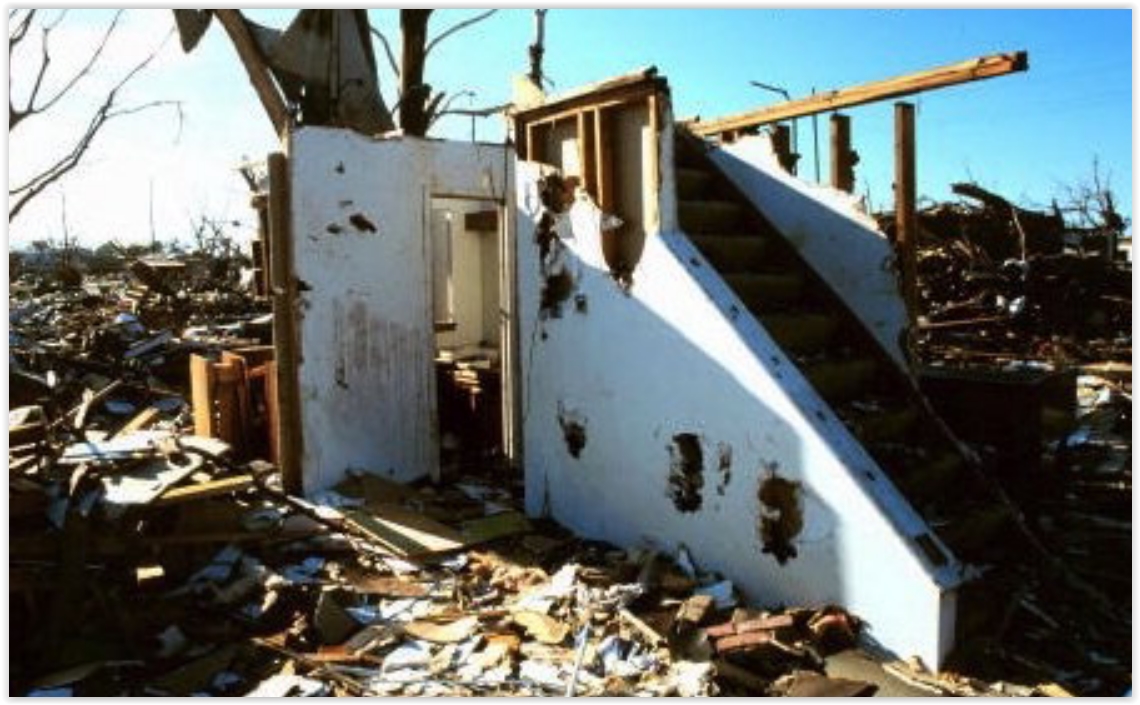 The Worst-Case Scenario: How To Ride Out a Tornado
The Worst-Case Scenario: How To Ride Out a Tornado. Here's an excerpt of a good, timely post at
al.com: "...
The
best place to ride out a tornado is in a storm shelter, or the smallest
room in the center of the building you'€™re in on the lowest floor,
such as a closet or bathroom, interior hall or under a stairwell. Get
away from windows. Get under something that can protect you from flying
debris, which is the greatest danger in tornadoes, according to NOAA'€™s
Storm Prediction Center.
Cover yourself with a mattress or sleeping bag. Know where the heavy
things are on the floors above you and don't get under them. Get as low
to the floor as you can and cover your head with your hands..."
Photo credit above: "
One
of the safest places to ride out a tornado in your home is under on the
lowest floor, in an interior room, away from windows. This stairwell
was just about the only thing left standing after a tornado." (NSSL photo).
Stormbox: Above-Ground Tornado Shelters.
Granted, you may not want a massively-reinforced shipping container
sitting in your back yard, but if an EF-5 tornado is approaching this is
where I would want to be if I didn't have access to an underground
shelter.
More details: "
Every
STORMBOX starts with a refabricated mobile storage unit, reinforced
with materials robust enough to withstand the worst Mother Nature can
devise, and engineered for accessibility and reliability. Unlike
previous generations of storm shelters, STORMBOX is designed to sit
above the ground, allowing fast and easy access, including wheelchair
accessibility, through the reinforced door. The aboveground design also
helps prevent flooding and debris blockage caused by weather events. The
fabrication process for every STORMBOX ensures that each product is
always reliable, built using green construction practices, and less
expensive than traditional underground storm shelters. With models
available to accommodate up to 80 people, STORMBOX is the reliable
solution for families, neighborhoods, schools and businesses..."
* Vilonia, Arkansas - hit by an EF-5 tornado in 2014, just installed one of these near their city hall, as reported by
KATV.com.
A Tornado's Heading Your Way. Now What?
Are there ever circumstances where trying to drive away from a tornado
makes sense? It's a tough question, but if it's an EF-4 or EF-5 and you
don't have a basement, the tornado may not be survivable. Here's an
excerpt from
CNN: "...
My
advice would be to seek the safest place available. That is: lie in a
ditch or ... (get) behind a heavy object if you had a tractor or even a
tree." He cited the 1979 Wichita Falls, Texas, tornado as a cautionary
lesson. That twister killed 54 people and, Kiesling noted, "many people
were killed in automobiles because they tried to outrun it." Still,
Kiesling allowed, there may be times when fleeing an impending tornado
might be a good option. "If you have good information on the storm, if
you have plenty of warning, if you have an automobile, it may make
sense, but I personally don't feel that's the advice that we want to
give the public..."
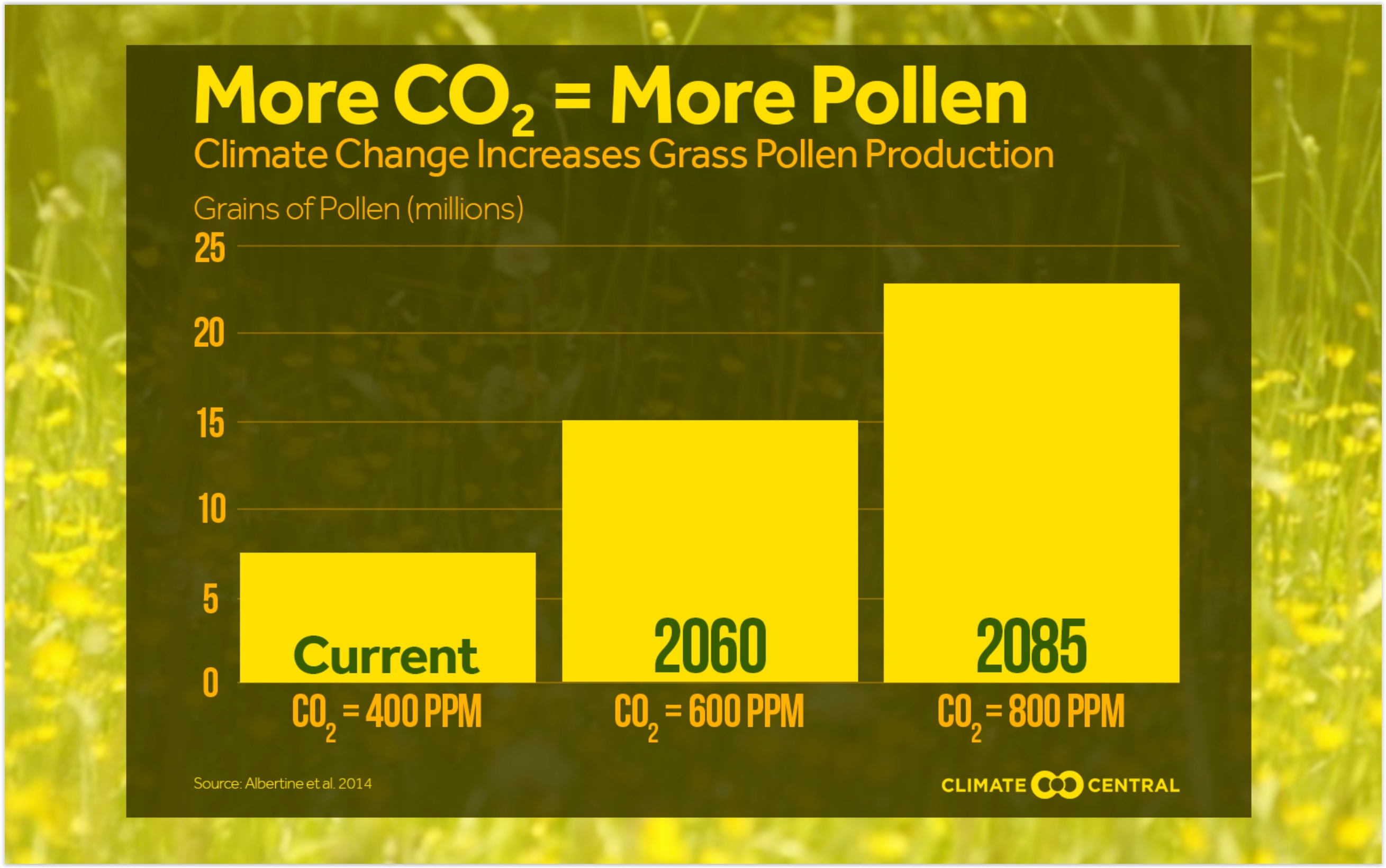 Nothing to Sneeze At: More CO2 = More Pollen
Nothing to Sneeze At: More CO2 = More Pollen. Here's an excerpt of a story at
Climate Central: "...
In a previous report,
we illustrated how ragweed pollen production increases with CO2 levels.
New research continues to shed light on the relationship between pollen
and climate change. While ragweed studies give one example of how
pollen is impacted by higher levels of CO2, other plants have also been
subsequently examined. In this report, we highlight a new study that
looks at Timothy Grass pollen, a major cause of allergies during the
early summer. Researchers investigated the amount of pollen produced at
CO2 concentrations of 400 ppm, which is near current levels, and 800
ppm, which we would pass before the end of the century if current
emissions trends continue. Not surprisingly, the grass produced about
twice as much pollen at 800 ppm..."
San Diego Republican Mayor Pushes Plan to Run on 100% Renewable Energy. Here's an excerpt from
The Guardian: "...
But
San Diego’s bipartisan push to embrace clean energy such as solar and
wind, while radically paring back greenhouse gas emissions by 80% by
2050, is a glimpse into how the rancorous brawls over climate change
could have been avoided across the rest of the US. “This isn’t a
partisan issue,” Faulconer told the Guardian. “I’ve said from the very
beginning there’s enough partisan politics at the national level. I was a
volunteer for our parks before becoming mayor; I love our natural
resources, our beaches and landscapes. I feel strongly about protecting
them...”
Photo credit above: "
San Diego is among a large group of cities impatient with federal government bickering over climate change." Photograph: Gregory Bull/AP.
In Minnesota, Waste to Energy Debate Firing Up Once Again. Here's the intro to a story at
Midwest Energy News: "
Three
prominent Minnesota environmental and community action organizations
recently announced they are joining forces in an effort to close a solid
waste incinerator on the edge of downtown Minneapolis. The Sierra
Club’s statewide chapter, Neighborhoods Organizing for Change and
Minnesota Public Interest Research Group met in April
to create a collective campaign to close the Hennepin Energy Recovery
Center, better known as HERC. The groups’ concerns — primarily about
local impacts from pollution — put them at odds with Minnesota state
policy, which places a higher value on waste-to-energy production over
landfills..."
Photo credit: "
The Hennepin Energy Recovery Center near downtown Minneapolis."
Curt Shilling: ESPN Employs "Some of the Biggest Racists in Sports Commentating." Tell me how you really feel, Curt. Here's a clip from an eye-opening story at
The Washington Post: "
Curt
Schilling was fired by ESPN last week for “unacceptable conduct,” which
was understood to involve his penchant for sharing politically
controversial comments and memes via social media. Now the former
pitcher is apparently free to train his fire squarely on the network
that parted ways with him. In an interview Wednesday with the “Breitbart News Patriot Forum”
on Sirius XM radio, Schilling said, “Some of the most racist things
that I’ve ever heard come out of people that are on the air at ESPN..."
Image credit above: "
Former
Red Sox pitcher and ESPN analyst Curt Schilling was fired after he
posted a seemingly transphobic meme on his Facebook. Here are some other
times he's offended people." (Monica Akhtar/The Washington Post)
A Majority of Millenials Now Reject Capitalism, Poll Shows. My first reaction was, huh? Where are we living - Sweden? Be careful what you wish for. Here's a clip from
The Washington Post: "
In
an apparent rejection of the basic principles of the U.S. economy, a
new poll shows that most young people do not support capitalism. The
Harvard University survey, which polled young adults between ages 18 and
29, found that 51 percent of respondents do not support capitalism.
Just 42 percent said they support it. It isn't clear that the young
people in the poll would prefer some alternative system, though. Just 33
percent said they supported socialism. The survey had a margin of error
of 2.4 percentage points..."
Image credit above:
Amy Cavenaile/The Washington Post; iStock; Emojipedia.
The King of Frequent Flier Miles? Quora has an interesting post - not feeling nearly as good about my 900K with Delta: "
I'm
going to have to go with Fred Finn, with 15 million miles, to include
718 Concorde flights—logging three crossings in a day once. Being a
British citizen, he's evidently garnered more miles with British Airways
than any other, but I can't find all of the airlines—139 countries is a
lot and must mean lots of other airlines—nor if BA has a majority of
the impressive total."
Minneapolis: "Hell's Half Acre?"
I suspect the city has cleaned itself up in the last 100-150 years,
literally and figuratively. Here's an excerpt of an intriguing story at Atlas Obscura: "...The
name has been applied to those vice areas of those communities but also
to physical geographical terrain that is also deadly, or very
dangerous, or very arduous to try to cross: lava fields and basalt
fields and things like that,” said Marilyn Hudson, author of Tales of Hell's Half Acre: Murder, Mayhem, and Mysteries of Early Oklahoma and Oklahoma City.
But mostly, newspapers titillated readers while condemning drunkenness
and debauchery in Hell’s Half Acres that ranged from Wild West-era
saloon districts in Texas, Oklahoma and Colorado to poor urban slums, including struggling African-American neighborhoods in the Southeast and white working-class enclaves in Chicago, Philadelphia, Brooklyn and Minneapolis..."
TODAY: Mostly cloudy, milder. Winds: NE 7-12. High: 58
FRIDAY NIGHT: Patchy clouds, still cool. Low: 43
SATURDAY: Clouds increase, PM rain southern MN. Winds: NE 10-20. High: 59
SUNDAY: Nicer day of the weekend? Drying out again, peeks of sun. Wake-up: 42. High: 61
MONDAY: Partly sunny, feels like spring again. Winds: E 5-10. Wake-up: 45. High: 67
TUESDAY: Plenty of sun, lukewarm breeze. Winds: W 10-15. Wake-up: 43. High: 71
WEDNESDAY: Blue sky, extra spring in your step. Winds: NW 8-13. Wake-up: 48. High: 68
THURSDAY: Sunny streak continues, more humidity. Winds: W 10-15. Wake-up: 44. High: 72
Climate Stories...
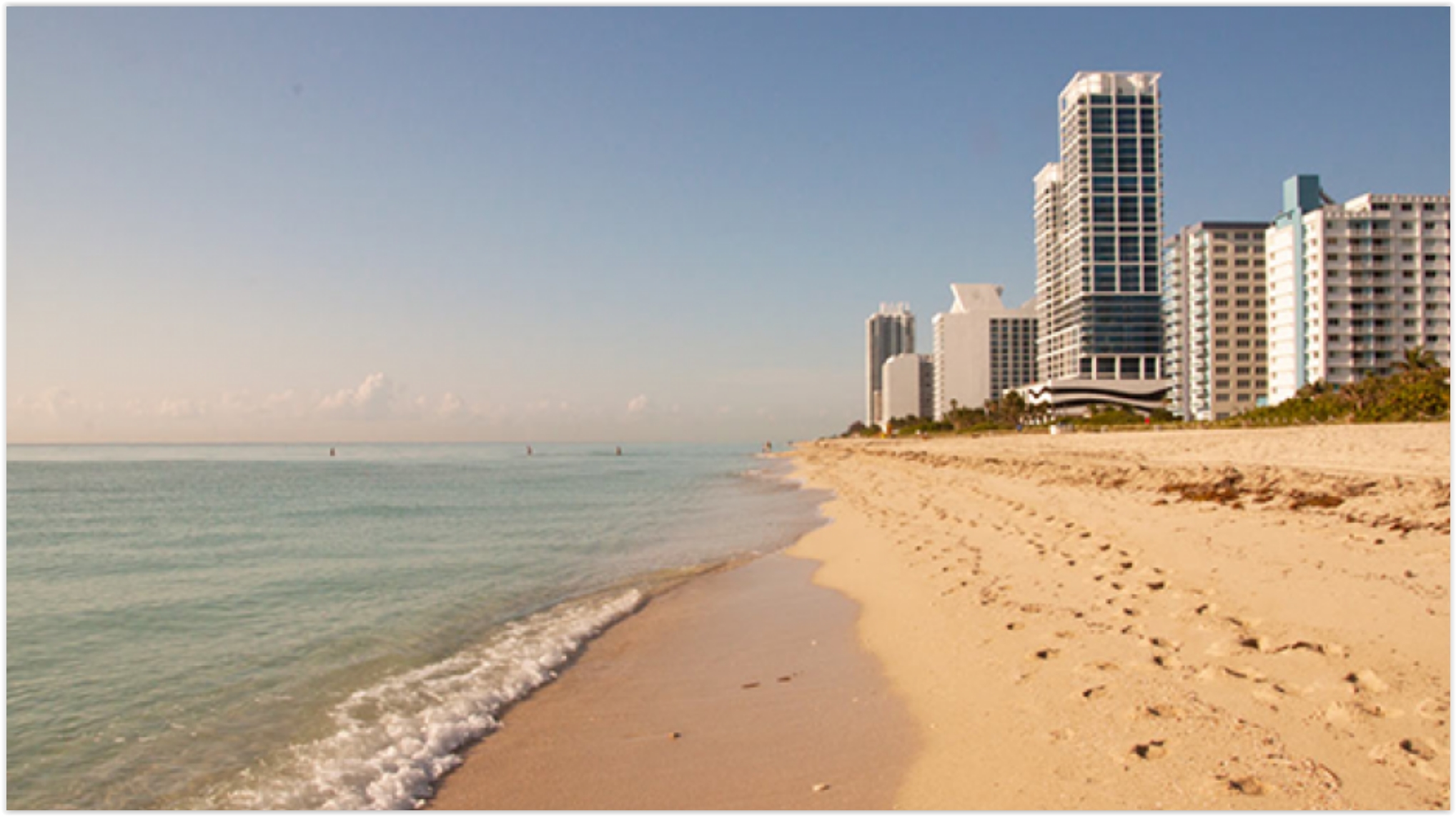 Climate Change Could Threaten Trillions of Dollars of Financial Assets, a New Study Reports.
Climate Change Could Threaten Trillions of Dollars of Financial Assets, a New Study Reports. Here's the intro to a story at PRI,
Public Radio International: "
New
research from the London School of Economics estimates that a broad
range of global stocks and other financial assets are overvalued because
investment managers don’t take the risks of climate change into
account. The LSE research estimates financial assets worldwide are
presently overvalued by $2.5 trillion — and, in the worst case, $24
trillion. Massive climate-related writedowns are not far off in the
future, which would mean huge losses for investors who ignore the risks,
says Alex Bowen of the Grantham Research Institute on Climate Change at
LSE and co-author of the new study, published in Nature Climate Change..."
Photo credit above: "
Coastal
real estate in cities like Miami are one type of asset that may be
dangerously overvalued, if climate change proceeds as scientists predict."
Credit: Daniel Chudosov/Flickr.
Half of U.S. Conservatives Say Climate Change is Real. The ship is turning, as the symptoms of a rapidly warming climate become harder to dismiss or deny. Here's a clip from
Bloomberg: "
The
percentage of conservative Republicans who consider global warming a
threat shot up 19 points in two years, to 47 percent, according to
public opinion researchers at Yale University and George Mason
University. Overall, 56 percent of Republicans agree that it’s
happening. Including Democrats and independents, the national average
for the U.S. is 73 percent. The new survey results, “Politics & Global Warming 2016,”
suggest a growing gap between what most registered Republican voters
understand to be true and what the party leadership says it believes,
particularly on the presidential campaign trail this year..."
Politics and Global Warming, Spring 2016. Here's an excerpt from
Yale Program on Climate Change Communication that got my attention:
- An
increasing number of registered voters think global warming is
happening. Three in four (73%, up 7 points since Spring 2014) now think
it is happening. Large majorities of Democrats—liberal (95%) and
moderate/conservative (80%)—think it is happening, as do three in four
Independents (74%, up 15 points since Spring 2014) and the majority of
liberal/moderate Republicans (71%, up 10 points).
- By
contrast, only 47% of conservative Republicans think global warming is
happening. Importantly, however, there has been a large increase in the
number of conservative Republicans who think global warming is
happening. In fact, conservative Republicans have experienced the
largest shift of any group—an increase of 19 percentage points over the
past two years....
Q&A: A Canadian Evangelical Confronts U.S. Climate Politics.
Here is a good summary and terrific interview transcript with one of my
personal heroes, climate scientist Katherine Hayhoe, who recently
visited Minnesota - courtesy of
Midwest Energy News: "...
It
is not politically acceptable to say that climate change is a problem
but we don’t want to do anything about it. But it is politically
acceptable to say, it’s going to cost too much and I care about other
things. It’s acceptable to say the science isn’t settled. It is
definitely acceptable to say an all-powerful sovereign God would never
let this happen. These are very acceptable statements in the United
States in 2016..."
File photo credit: "
Climate scientist Katharine Hayhoe speaks at Hardin-Simmons University in Texas in 2012."
Catholic Bishops: "Confronting Climate Change is our Moral Obligation.
As tempting as it is to look away or change the subject, as people of
faith we (all) have a duty to pay attention and be part of the solution.
Here's a snippet from
TheHill: "...
Climate
change threatens all life—and the life cycle of the earth itself.
Climate change attacks the human dignity of those most affected, with
the least fortunate bearing a disproportionate burden from its impacts.
What the scientific consensus tells us, and what real observations and
experiences around the world have shown us, is that humanity’s current
reliance on fossil fuels is altering the atmosphere. Warmer oceans and
higher temperatures are already being connected with increased sea
levels, storm surges, rainfall intensities and droughts, as well as
disruptions in growing seasons and migratory patterns. In Laudato Sí,
Pope Francis highlighted the urgency of our task: “Technology based on
the use of highly polluting fossil fuels – especially coal, but also oil
and, to a lesser degree, gas – needs to be progressively replaced
without delay.” We have a moral obligation to reduce carbon pollution,
to protect people from climate impacts and to safeguard human health..."
The Clean Energy Revolution.
If we jump-start and empower the markets we might just need less
regulation to have the (growing) economy we all want - without the
unpleasant side-effects. Here's a clip from
Foreign Affairs: "...
But without major advances
in clean energy technology, the Paris agreement might lead countries to
offer only modest improvements in their future climate plans. That will
not be enough. Even if they fulfill their existing pledges, the earth
will likely warm by some 2.7 to 3.5 degrees Celsius—risking planetary
catastrophe. And cutting emissions much more is a political nonstarter,
especially in developing countries
such as India, where policymakers must choose between powering economic
growth and phasing out dirty fossil fuels. As long as this tradeoff
persists, diplomats will come to climate conferences with their hands tied..."
Republican Donor Backs Clean Energy Senators with Digital Campaign. Here's an excerpt from
Reuters that left me encouraged: "
A
Republican political donor said on Wednesday he would spend "seven
figures" on a targeted digital campaign backing two senators who support
clean energy policies, which could help tip the balance in their tight
November re-election races. Jay
Faison, a Charlotte, North Carolina-based executive of an audio-vision
equipment company, said he would endorse Republican Senator Rob Portman
of Ohio and Senator Kelly Ayotte of New Hampshire for re-election.
Portman is a co-sponsor of a bipartisan energy efficiency bill, while
Ayotte is one of the only Republican supporters of President Barack
Obama's plan to cut carbon emissions..." (File photo: Charlotte Observer).

Scientist Offers Hopeful Look at Climate Change.
We'll figure this out - collectively - because in the end we won't have
a choice in the matter. The last time I checked there is no Planet B.
Here's an excerpt from
The San Diego Union-Tribune: "
Amid
the gloomy forecast of climate change, climatologist Richard Somerville
sees a glimmer of light. Somerville, a distinguished professor emeritus
and research professor at Scripps Institution of Oceanography in La
Jolla, will speak at U.C. San Diego Thursday about the prospects for
turning the tide on the worst impacts of global warming. “This is not a
gloom and doom issue,” Somerville said. “It’s a serious issues but the
world is taking the right steps to deal with it in a rational way.” His
talk, “Climate Change: Strong Science, Forceful Actions, Positive
Outcomes,” will cover what we know about climate change and what
Somerville believes we need to do..."
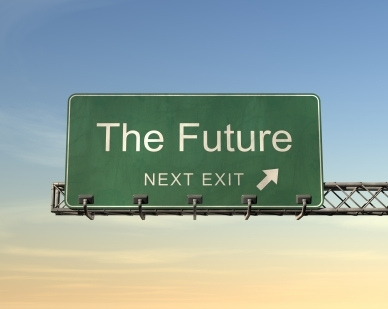
Scientists Now Know the Psychology Behind Your Worries About the Environment. Here's a clip from The Washington Post: "...Past research has highlighted that those who care about the environment tend to be “Open to Experience” — wanting to try out new things and new experiences — and also to have high levels of empathy, or sensitivity to the suffering of others (including not just humans, but plants and animals). New research,
though, suggests there’s a more intellectual side to being green as
well. In particular, it finds that those with a tendency to engage in
what is called “systems thinking” — embracing complex, multifaceted
causal explanations for phenomena and recognizing the unpredictability
of how nature works — also tend to value the environment more and to be
more concerned about climate change..."
Why States and Cities Must Lead The Way on Climate Change. Here's an excerpt of an Op-Ed at
The Wall Street Journal: "...
The
truth is that despite the large-scale, global impact of climate change,
it is the states and cities, not Washington D.C., that have most of the
legal powers to prevent global warming by helping the United States
transition to cleaner energy. States create energy building codes;
localities enforce them. Cities establish the zoning that governs
sprawl. They make mobility investments that can simultaneously save
adults from traffic jams and children from asthma. State commissions
regulate investor-owned electric utilities and the policies that either
reward or punish customers who want to produce their own power..."
Image credit above: "
The
truth is that despite the large-scale, global impact of climate change,
it is the states and cities, not Washington D.C., that have most of the
legal powers to prevent global warming," says WSJ Energy Expert Bill
Ritter." Photo: iStock Photo.
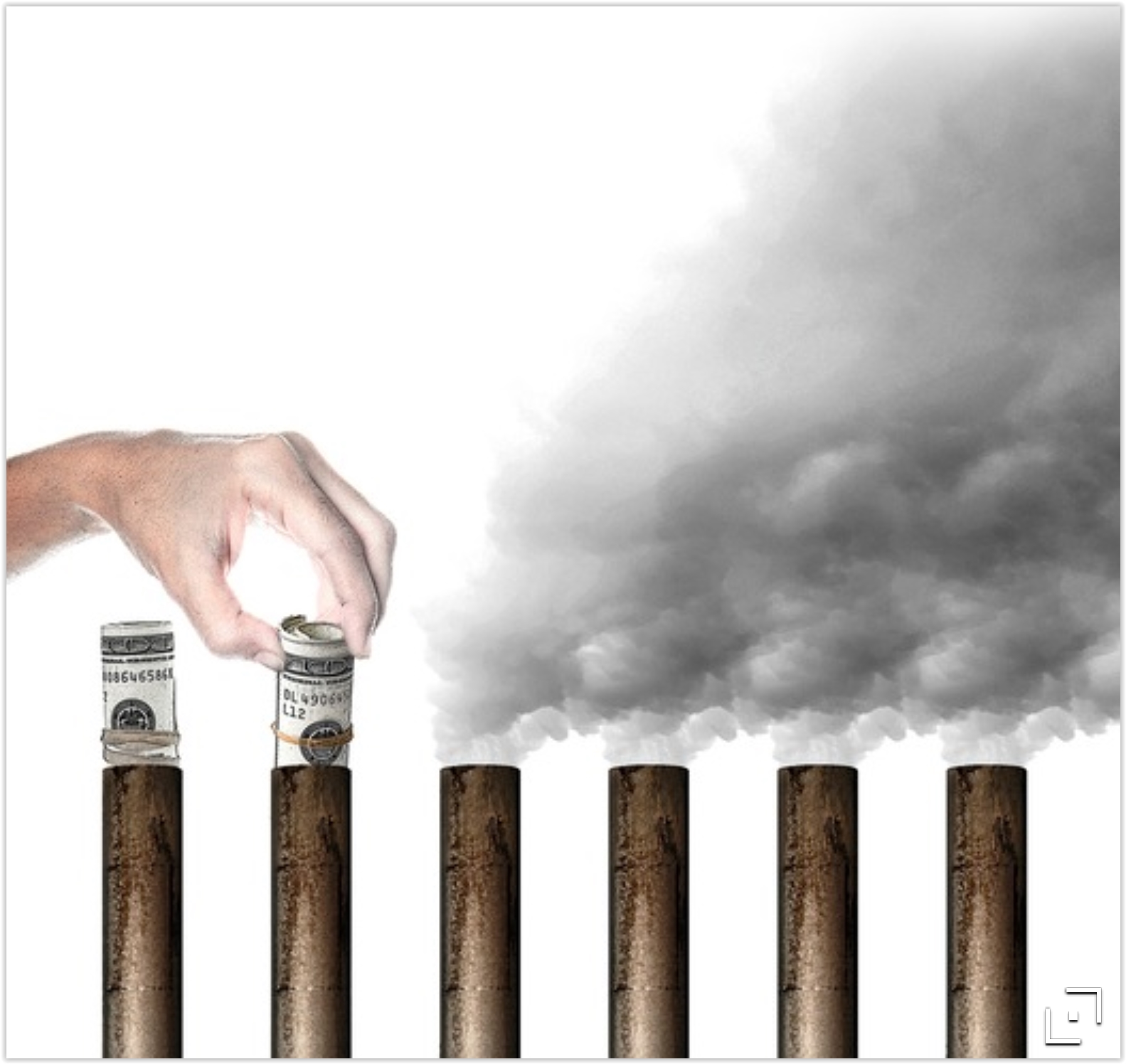 The Political Hurdles Facing a Carbon Tax - And How To Overcome Them. How do you adequately factor (real) costs into the equation? Dave Roberts has an interesting post at Vox; here's a clip: "...The
point is, carbon prices, where they exist, are too low. Why? The
obvious answer is that carbon pricing faces various political
constraints, which prevent the carbon price from rising to the proper
(high) level. Unfortunately, these political constraints are not nearly as well-understood
as the economic dynamics of carbon pricing. Among climate economists
and wonks, the hunches, pet theories, and ritual invocations of
"political will" too often are substitutes for deeper, systemic
political analysis. The Jenkins-Karplus paper is an attempt to make some
progress on that score. It sets out to model carbon pricing scenarios,
seeking to determine which policy design leads to the greatest aggregate
social welfare under various political constraints
The Political Hurdles Facing a Carbon Tax - And How To Overcome Them. How do you adequately factor (real) costs into the equation? Dave Roberts has an interesting post at Vox; here's a clip: "...The
point is, carbon prices, where they exist, are too low. Why? The
obvious answer is that carbon pricing faces various political
constraints, which prevent the carbon price from rising to the proper
(high) level. Unfortunately, these political constraints are not nearly as well-understood
as the economic dynamics of carbon pricing. Among climate economists
and wonks, the hunches, pet theories, and ritual invocations of
"political will" too often are substitutes for deeper, systemic
political analysis. The Jenkins-Karplus paper is an attempt to make some
progress on that score. It sets out to model carbon pricing scenarios,
seeking to determine which policy design leads to the greatest aggregate
social welfare under various political constraints..." (Image credit: Star Tribune).
Big Oil Ads Beat Out Climate News on CNN. But those ads pay the bills, another inconvenient truth. When in doubt, follow the money. Here's an excerpt at
Huffington Post: "
Fossil
fuel ads are drowning out news reports about climate change on CNN.
During one week in January, just after NASA announced that 2015 was the
hottest year on record, CNN viewers saw over 10 times more advertising
from the oil and gas industry than reporting about the world’s climate,
according to a new study from
the nonprofit Media Matters. While the cable news network devoted less
than a minute to stories about the warming planet that week, it sold
over 13 minutes of air time to the American Petroleum Institute, the
country’s largest oil and gas trade group..."
"There Is No Doubt". Exxon Knew CO2 Pollution Was A Global Threat by late 1970s. Here's a snippet of a post at
DeSmogBlog: "
Throughout Exxon’s global operations, the company knew that CO2
was a harmful pollutant in the atmosphere years earlier than previously
reported. DeSmog has uncovered Exxon corporate documents from the late
1970s stating unequivocally “there is no doubt” that CO2 from the burning of fossil fuels was a growing “problem” well understood within the company.
“It is assumed that the major contributors of CO2 are the burning of fossil fuels… There is no doubt that increases in fossil fuel usage and decreases of forest cover are aggravating the potential problem of increased CO2 in the atmosphere. Technology exists to remove CO2 from stack gases but removal of only 50% of the CO2 would double the cost of power generation.” [emphasis added]
Those
lines appeared in a 1980 report, “Review of Environmental Protection
Activities for 1978-1979,” produced by Imperial Oil, Exxon’s
Canadian subsidiary..."
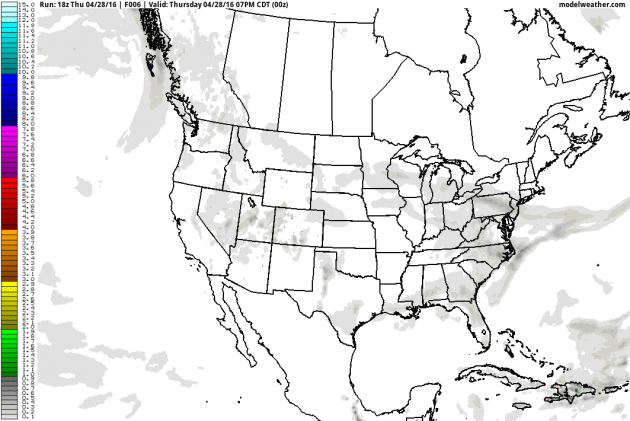
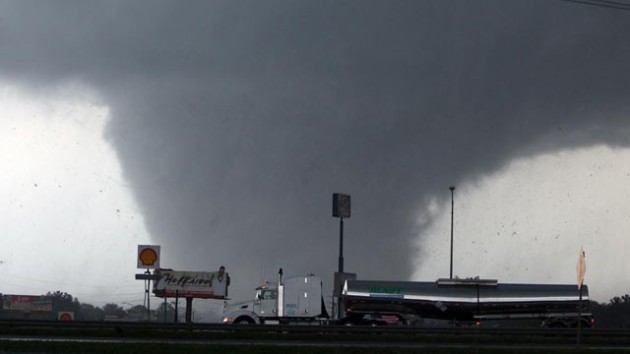

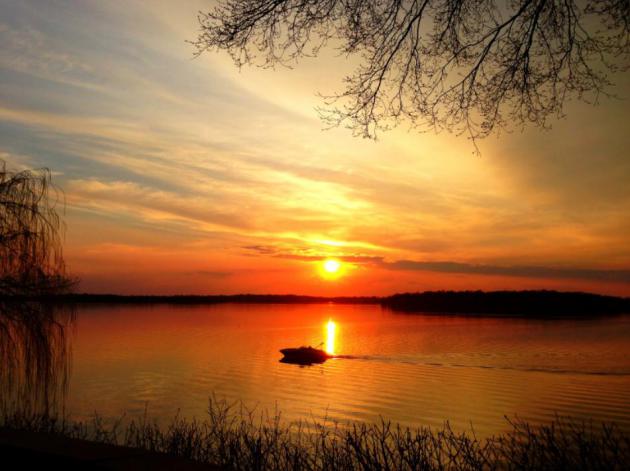
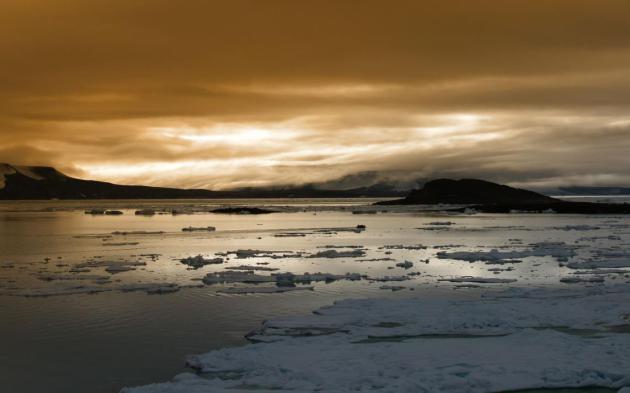
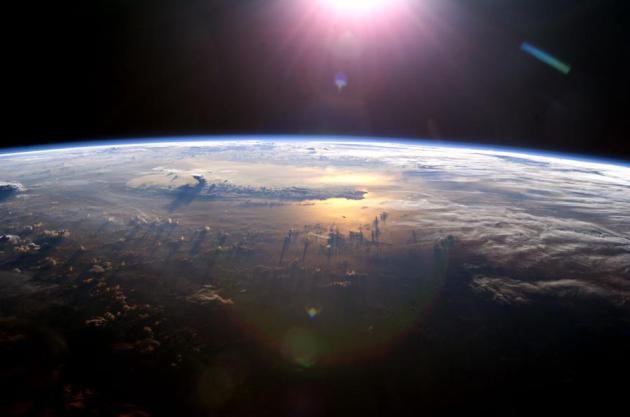

No comments:
Post a Comment